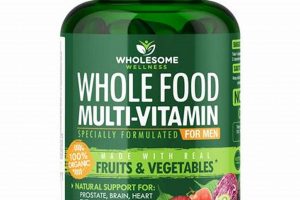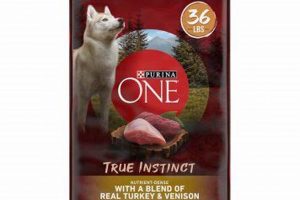Dietary management plays a crucial role in supporting the health and well-being of older canines diagnosed with cardiac conditions. A specially formulated food can help manage symptoms, slow disease progression, and improve quality of life. Consider, for instance, that a senior dog with a heart murmur might benefit from a diet lower in sodium to help reduce fluid retention and blood pressure, coupled with adequate levels of taurine and L-carnitine to support heart muscle function.
Optimized nutrition provides several advantages for senior dogs facing cardiac challenges. A carefully chosen diet can aid in maintaining a healthy weight, which reduces strain on the cardiovascular system. It can also contribute to regulating blood pressure, supporting kidney function (which is often compromised in heart disease), and providing essential nutrients that contribute to cardiac muscle strength and efficiency. Historically, veterinary cardiologists have emphasized the importance of diet in managing these conditions, leading to the development of specific formulations to address the unique needs of senior dogs with heart issues.
The following information addresses key nutritional considerations and specific ingredients to look for when selecting a diet for senior dogs with heart murmurs. These factors include appropriate protein levels, controlled sodium content, and the inclusion of beneficial supplements that support cardiovascular health. Understanding these elements is essential for making informed decisions about the nutritional care of geriatric canines with heart ailments.
Nutritional Tips for Senior Dogs with Heart Murmurs
Careful dietary management is paramount for senior dogs diagnosed with heart murmurs. The following tips outline key nutritional considerations for supporting cardiovascular health and overall well-being.
Tip 1: Monitor Sodium Intake: Excess sodium can exacerbate fluid retention and increase blood pressure. Select dog foods with controlled sodium levels, typically specified on the product label. Consult with a veterinarian to determine the appropriate sodium level for the dog’s specific condition. Aim for dog foods with values less than 0.4% on a dry matter basis.
Tip 2: Ensure Adequate Protein: While restricting protein was once common in managing heart disease, current recommendations emphasize providing adequate, high-quality protein to maintain muscle mass. Cardiac cachexia (muscle wasting) is a serious concern in advanced heart disease. Opt for dog foods with readily digestible protein sources, such as lean meats or eggs. Typically, protein levels ranging from 18-25% on a dry matter basis are acceptable, but veterinary guidance should be sought.
Tip 3: Incorporate Taurine and L-Carnitine: These amino acids play vital roles in cardiac muscle function. Taurine supports cardiac contractility and helps regulate electrolyte balance, while L-carnitine aids in energy production within heart muscle cells. Many therapeutic cardiac diets include supplemental taurine and L-carnitine. If using a standard senior food, consider adding these supplements after consulting with a veterinarian.
Tip 4: Maintain Optimal Body Weight: Obesity places additional strain on the cardiovascular system, while excessive weight loss can contribute to muscle wasting. Regularly monitor body condition score and adjust food portions as needed to maintain an ideal weight. Use a body condition scoring chart to help determine whether the dog is underweight, overweight, or at an ideal weight.
Tip 5: Consider Omega-3 Fatty Acids: Omega-3 fatty acids, particularly EPA and DHA found in fish oil, possess anti-inflammatory properties and may benefit cardiac function. These fatty acids can help reduce arrhythmias and improve blood flow. Supplementing with fish oil or selecting a dog food enriched with omega-3 fatty acids may be beneficial; however, consult a veterinarian before adding any supplements.
Tip 6: Control Phosphorus Levels: Senior dogs with heart murmurs often have concurrent kidney issues. High phosphorus levels can further strain the kidneys. Choose dog foods with moderate phosphorus content to support both cardiac and renal function. Typically, values less than 0.5% on a dry matter basis are desirable in cases of concurrent heart and kidney disease.
Tip 7: Avoid Grain-Free Diets Unless Medically Indicated: Emerging evidence suggests a potential link between grain-free diets, particularly those high in legumes, and dilated cardiomyopathy (DCM) in dogs. Unless there’s a specific allergy or medical reason to avoid grains, it’s generally advisable to choose a well-formulated diet containing grains. Consult a veterinary cardiologist for more detailed information.
Prioritizing these nutritional considerations contributes significantly to managing heart murmurs in senior dogs. By carefully selecting a diet that supports cardiac function, maintaining a healthy weight, and addressing potential concurrent health issues, the overall quality of life for affected dogs can be substantially improved.
In conclusion, dietary intervention is an integral part of managing heart disease in senior canines. Working closely with a veterinarian or veterinary cardiologist to formulate a personalized nutritional plan is essential for optimizing the dogs health and longevity.
1. Controlled Sodium Content
The sodium content in canine diets holds significant relevance, particularly when considering the nutritional needs of senior dogs diagnosed with heart murmurs. A heart murmur, often indicative of underlying cardiac dysfunction, can lead to compromised circulatory efficiency. In such cases, the kidneys may respond by retaining sodium and water, leading to increased blood volume and elevated blood pressure. This, in turn, places additional strain on the already weakened heart. A diet characterized by controlled sodium content aims to mitigate this cycle by reducing the amount of sodium available for retention, thus helping to manage blood volume and pressure.
The inclusion of controlled sodium levels in the diet is, therefore, a crucial component of what constitutes appropriate nourishment for senior dogs with heart murmurs. Diets exceeding the recommended sodium levels can exacerbate the symptoms of heart disease, potentially leading to or worsening congestive heart failure. For instance, a dog with a pre-existing mitral valve insufficiency and a heart murmur might experience increased coughing, labored breathing, and fluid accumulation in the lungs if fed a diet high in sodium. Conversely, a controlled sodium diet can help reduce these symptoms, leading to improved comfort and quality of life. Veterinary therapeutic diets specifically formulated for cardiac conditions typically adhere to strict sodium limits.
Understanding the importance of controlled sodium content enables informed decision-making regarding canine nutrition. While commercial dog foods provide nutritional information, including sodium content, interpretation requires veterinary expertise. Determining the appropriate sodium level depends on the severity of the heart condition, concurrent medical issues (such as kidney disease), and other individual factors. Therefore, consulting with a veterinarian to establish an appropriate sodium target and select a suitable diet remains essential. Furthermore, owners must avoid adding sodium-rich table scraps or treats to the dog’s diet to maintain the benefits of the controlled sodium content in the selected food. The ultimate goal is to minimize the burden on the heart and improve the overall well-being of the senior canine.
2. Adequate Taurine, L-Carnitine
The inclusion of adequate taurine and L-carnitine is a critical consideration when formulating dietary recommendations for senior canines with heart murmurs. These amino acids play distinct, yet complementary, roles in supporting cardiac function and mitigating the progression of certain heart conditions. The provision of sufficient levels through diet becomes increasingly important in older dogs, as their natural production or absorption of these nutrients may decline.
- Taurine’s Role in Cardiac Function
Taurine is an amino acid crucial for maintaining proper cardiac function. It supports calcium regulation within heart muscle cells, which is essential for effective contraction and relaxation of the heart. Taurine also exhibits antioxidant properties, protecting cardiac tissue from oxidative stress. Furthermore, it aids in stabilizing cell membranes and regulating electrolyte balance, factors vital for preventing arrhythmias. In certain breeds, taurine deficiency has been linked to dilated cardiomyopathy (DCM), a condition where the heart muscle weakens and enlarges. Supplementation with taurine can help improve cardiac contractility and potentially reverse or slow the progression of DCM, especially in cases related to dietary deficiency.
- L-Carnitine’s Role in Energy Production
L-Carnitine plays a pivotal role in energy metabolism within the heart muscle. It facilitates the transport of fatty acids into the mitochondria, the powerhouses of cells, where they are burned for energy. The heart relies heavily on fatty acids as a fuel source, making L-carnitine essential for maintaining adequate energy production. In dogs with heart disease, the heart muscle may become less efficient at utilizing energy. Supplementing with L-carnitine can improve energy production, enhance cardiac contractility, and reduce the risk of myocardial damage.
- Dietary Sources and Supplementation
Taurine is primarily found in animal-based protein sources, such as meat, poultry, and fish. L-carnitine is also present in animal tissues, although in varying amounts. Senior dogs with heart murmurs may benefit from diets enriched with these nutrients or from direct supplementation. Therapeutic cardiac diets often include supplemental taurine and L-carnitine to ensure adequate intake. When considering supplementation, it’s crucial to consult with a veterinarian to determine the appropriate dosage based on the dog’s individual needs and medical condition. High-quality meat-based ingredients can also contribute to a dog’s intake of these vital nutrients.
- Considerations for Specific Cardiac Conditions
While taurine and L-carnitine are beneficial for many senior dogs with heart murmurs, their efficacy may vary depending on the specific underlying cardiac condition. For example, dogs with DCM are often more likely to benefit from supplementation than those with valvular heart disease. Moreover, the response to supplementation can be influenced by other factors, such as age, breed, and concurrent medical conditions. Therefore, a comprehensive assessment by a veterinarian, including diagnostic testing, is essential to determine whether taurine and L-carnitine supplementation is appropriate and to monitor the dog’s response to treatment. Regular checkups are paramount in evaluating the efficacy of the dietary plan and adjusting it as needed.
In summary, the inclusion of adequate taurine and L-carnitine is a significant factor to consider when selecting the optimal diet for senior canines with heart murmurs. These nutrients support cardiac function, enhance energy production, and may help mitigate the progression of certain heart conditions. The specific needs of each dog should be assessed by a veterinarian to determine the appropriate dietary plan and to monitor the effectiveness of the chosen nutritional approach. Careful attention to these dietary components can contribute to improved quality of life and overall well-being for senior dogs facing cardiac challenges.
3. Optimal Protein Levels
Appropriate protein levels in canine diets are particularly critical when addressing the nutritional needs of senior dogs with heart murmurs. While previous dietary recommendations for heart disease often suggested protein restriction, current veterinary cardiology emphasizes the importance of maintaining adequate protein intake to prevent or mitigate cardiac cachexia, the involuntary loss of muscle mass. Cardiac cachexia is a significant concern in dogs with advanced heart disease, as it contributes to weakness, reduced quality of life, and increased mortality. Therefore, the focus shifts to providing high-quality protein sources in appropriate amounts to support muscle mass without placing undue stress on other organs, especially the kidneys.
The connection between optimal protein levels and what constitutes suitable nourishment for senior dogs with heart murmurs is multifaceted. Firstly, sufficient protein intake ensures the availability of essential amino acids necessary for muscle protein synthesis. For instance, a senior dog with mitral valve disease experiencing mild cardiac cachexia might benefit from a diet with readily digestible protein sources, such as lean poultry or fish, to help maintain muscle mass and strength. Secondly, the kidneys play a vital role in filtering waste products from protein metabolism. In cases where heart disease coexists with kidney dysfunction, careful protein management is essential. Excessive protein intake can strain the kidneys, while insufficient protein can lead to muscle wasting. The ideal protein level must therefore be tailored to the individual dog, taking into account the severity of both heart and kidney disease. Diets should typically range from 18-25% protein on a dry matter basis, but veterinary guidance is crucial to determine the appropriate level for each specific case. A dog food labeled as “senior” or “renal support” might offer suitable protein levels, but verifying the exact content and consulting a veterinarian is necessary.
Understanding the significance of optimal protein levels enables responsible dietary management for senior dogs with heart murmurs. Veterinary assessment, including bloodwork to evaluate kidney function and muscle mass, is paramount. Monitoring the dog’s body condition score regularly and adjusting food intake accordingly is also essential. The challenge lies in finding the right balance between supporting muscle mass and minimizing strain on the kidneys. While a high-protein diet might seem beneficial for preventing muscle loss, it could be detrimental to a dog with compromised kidney function. Conversely, a severely protein-restricted diet could exacerbate cardiac cachexia and weaken the dog. The key is personalized nutrition guided by veterinary expertise. Ultimately, the goal is to optimize the dog’s nutritional status, maintain muscle mass, and support overall well-being, thereby improving the quality of life for senior canines facing cardiac challenges.
4. Phosphorus Management
Phosphorus management constitutes a critical component of nutritional strategies for senior dogs diagnosed with heart murmurs, particularly given the frequent comorbidity of cardiac and renal diseases in this population. Dietary phosphorus plays a significant role in kidney function, and its careful regulation is essential for minimizing the progression of chronic kidney disease (CKD), which can exacerbate cardiac issues and vice versa.
- Phosphorus and Renal Function
Elevated phosphorus levels in the bloodstream, known as hyperphosphatemia, are a hallmark of advancing CKD. The kidneys are responsible for excreting excess phosphorus, but their ability to do so diminishes as renal function declines. Hyperphosphatemia contributes to a cascade of negative effects, including secondary hyperparathyroidism, renal secondary hyperparathyroidism, mineral imbalances, and soft tissue calcification, all of which can further impair kidney function and potentially impact cardiovascular health. Controlling dietary phosphorus intake is, therefore, a primary strategy for slowing the progression of CKD and mitigating its complications in senior dogs with heart murmurs.
- Cardiac-Renal Syndrome
The interaction between the heart and kidneys is complex, and dysfunction in one organ can directly impact the other, a concept known as cardiac-renal syndrome. In senior dogs with heart murmurs, reduced cardiac output can compromise renal blood flow, leading to kidney damage. Conversely, kidney disease can contribute to fluid overload and hypertension, placing additional strain on the heart. Elevated phosphorus levels, resulting from kidney disease, can exacerbate cardiovascular problems by promoting vascular calcification and contributing to left ventricular hypertrophy. Consequently, managing phosphorus levels becomes essential not only for renal health but also for overall cardiovascular stability.
- Dietary Phosphorus Sources and Considerations
Phosphorus is present in varying amounts in different food ingredients. Animal-based proteins, bone meal, and some plant-based ingredients are rich sources of phosphorus. When selecting a diet for a senior dog with a heart murmur and suspected or confirmed kidney disease, choosing a formula with controlled phosphorus content is crucial. Veterinary therapeutic diets specifically designed for renal support typically have lower phosphorus levels compared to standard maintenance diets. Reading the guaranteed analysis on the food label and consulting with a veterinarian to determine the appropriate phosphorus level are essential steps in ensuring adequate phosphorus management.
- Monitoring and Adjustment
Regular monitoring of serum phosphorus levels through blood tests is necessary to assess the effectiveness of dietary phosphorus management. If phosphorus levels remain elevated despite dietary modifications, additional interventions, such as phosphate binders, may be required. Phosphate binders are medications that bind to phosphorus in the digestive tract, preventing its absorption into the bloodstream. Close collaboration with a veterinarian is crucial for adjusting the dietary plan and incorporating additional therapies as needed to maintain optimal phosphorus levels and support both cardiac and renal function in senior dogs with heart murmurs.
Optimal phosphorus management is integral to the nutritional care of senior dogs with heart murmurs, especially in cases of concurrent kidney disease. Careful selection of diets with controlled phosphorus levels, regular monitoring of serum phosphorus, and appropriate use of phosphate binders, when necessary, contribute to slowing the progression of CKD, mitigating its cardiovascular consequences, and improving the overall quality of life for affected dogs.
5. Omega-3 Fatty Acids
Omega-3 fatty acids, specifically eicosapentaenoic acid (EPA) and docosahexaenoic acid (DHA), present a significant connection to the selection of appropriate diets for senior canines with heart murmurs. These fatty acids exert anti-inflammatory effects, which are beneficial in counteracting the systemic inflammation often associated with chronic heart disease. Reduced inflammation can lead to improved endothelial function, which is critical for maintaining healthy blood vessels and efficient blood flow. Furthermore, omega-3 fatty acids can help mitigate the risk of arrhythmias, irregular heartbeats that can be life-threatening in dogs with pre-existing cardiac conditions. For instance, a senior dog diagnosed with atrial fibrillation, a common arrhythmia, might experience reduced frequency and severity of episodes with consistent dietary supplementation of EPA and DHA. Therefore, the inclusion of omega-3 fatty acids becomes a key factor when determining the suitability of a given food for senior dogs facing cardiac challenges.
The practical application of this knowledge translates into careful examination of dog food ingredient lists and nutritional analyses. Fish oil, a rich source of EPA and DHA, is frequently added to commercial dog foods. Salmon, flaxseed, and algal oil are other potential sources, although the conversion of plant-based omega-3s (alpha-linolenic acid or ALA) to EPA and DHA is less efficient in dogs. The amount of EPA and DHA needed to elicit a therapeutic effect often exceeds the levels found in standard maintenance diets, necessitating supplementation. For example, a senior dog with a heart murmur might require a daily dose of EPA and DHA derived from fish oil, carefully calculated based on body weight, to achieve demonstrable improvements in cardiac function and reduced inflammation. Consultation with a veterinary cardiologist is crucial to determine the appropriate dosage and to ensure that the supplement is compatible with any existing medications or medical conditions. The form of omega-3 also matters, with triglyceride forms generally considered more bioavailable than ethyl ester forms.
In conclusion, omega-3 fatty acids are a beneficial component to consider when choosing diets for senior dogs with heart murmurs due to their anti-inflammatory and antiarrhythmic properties. Successfully integrating omega-3 fatty acids into a canine’s diet requires careful attention to sourcing, dosage, and individual needs, guided by veterinary expertise. While omega-3 fatty acids offer considerable advantages, they are not a standalone solution. Instead, they should be viewed as part of a comprehensive nutritional strategy that also addresses sodium levels, protein content, and other essential factors, all tailored to the specific health profile of the senior dog. The overall challenge lies in customizing the diet to meet the unique requirements of each individual, maximizing the potential for improved cardiac health and quality of life.
Frequently Asked Questions
The following questions address common concerns regarding the dietary management of senior canines diagnosed with heart murmurs, providing clear and evidence-based information.
Question 1: How does sodium intake affect a senior dog with a heart murmur?
Excessive sodium intake can exacerbate fluid retention, increase blood pressure, and place undue stress on a compromised cardiovascular system. Controlled sodium levels are essential to help mitigate these effects and reduce the workload on the heart.
Question 2: Is a high-protein diet safe for senior dogs with heart murmurs?
While previous recommendations often advocated for protein restriction, current veterinary guidance emphasizes the importance of adequate, high-quality protein to prevent cardiac cachexia (muscle wasting). The specific protein level should be tailored to the individual dog, considering kidney function and the severity of heart disease. Veterinary consultation is essential.
Question 3: What are the benefits of taurine and L-carnitine supplementation?
Taurine supports cardiac contractility and helps regulate electrolyte balance, while L-carnitine aids in energy production within heart muscle cells. Supplementation may improve cardiac function, particularly in cases of dilated cardiomyopathy or carnitine deficiency. Consult with a veterinarian before administering any supplements.
Question 4: How important is maintaining an ideal body weight?
Maintaining an ideal body weight is crucial. Obesity places additional strain on the heart, while excessive weight loss contributes to muscle wasting. Regular body condition scoring and dietary adjustments are necessary to achieve and maintain a healthy weight.
Question 5: Can omega-3 fatty acids benefit senior dogs with heart murmurs?
Omega-3 fatty acids, particularly EPA and DHA found in fish oil, possess anti-inflammatory properties and may help reduce arrhythmias and improve blood flow. Supplementation may be beneficial, but veterinary guidance is essential to determine the appropriate dosage.
Question 6: Are grain-free diets recommended for senior dogs with heart murmurs?
Emerging evidence suggests a potential link between grain-free diets and dilated cardiomyopathy (DCM) in dogs. Unless there’s a specific allergy or medical reason to avoid grains, it’s generally advisable to choose a well-formulated diet containing grains. Veterinary consultation is recommended.
Careful attention to dietary management, in consultation with a veterinarian, can significantly improve the quality of life for senior dogs with heart murmurs. Personalized nutrition plans are essential for optimizing cardiac health and overall well-being.
The following section explores specific ingredients to look for in dog food formulations suitable for senior canines with heart ailments.
The preceding exploration underscores the critical role of targeted nutrition in managing cardiac conditions in senior canines. Key elements, including controlled sodium, appropriate protein levels, supplemental taurine and L-carnitine, phosphorus management, and omega-3 fatty acids, contribute significantly to cardiac support and overall well-being. Careful consideration of these factors is paramount when selecting the optimal diet.
The complex interplay between nutrition and cardiac health necessitates a collaborative approach with veterinary professionals. A thorough understanding of individual needs, coupled with informed dietary choices, empowers caregivers to enhance the quality of life and longevity of senior dogs facing heart murmur diagnoses. Continued research and veterinary advancements promise further refinements in nutritional strategies for these vulnerable animals.







